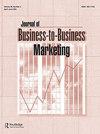Framing Static and Dynamic Time-Periods through the Teleological Lens in the Implementation Process of Enterprise Resource Planning
IF 2.5
4区 管理学
Q3 BUSINESS
引用次数: 0
Abstract
ABSTRACT Purpose Enterprise Resource Planning (ERP) is a technological tool which improves and eases B to B communication and reinforces business relationships as well as business-to-business (B to B) marketing. Based on a teleological lens in B to B relationships between ERP sellers and ERP buyers, the research objective of this study is to frame static and dynamic time-frames in the ERP implementation process in B to B markets. The aim is to shed light on the consideration of time-periods (i.e. past, present and future) as either tatic or dynamic in the implementation process of complex service solutions, such as ERP, in a B to B marketing setting. Design/methodology/approach This study is conducted with respect to Spanish companies focusing on the first main pre-implementation, first main implementation and first main post-implementation process of ERP software solutions in B to B markets. This study embraces a multi-method design consisting of the four phases. It enables data triangulation through in-depth structured interviews in a follow-up study, so as to validate the results. Findings Reports static and dynamic time-periods through a teleological lens in the implementation process of ERP in B to B market of the Spanish healthcare industry. This study indicates that more than half of the ERP buyers were not entirely satisfied, after finalizing the ERP implementation process. Subsequently, less than half of them received only a software solution and the rest considered they had received merely a somewhat adapted software solution. Furthermore, only one out of ten confirmed that the software solution obtained was a fully adapted solution beyond the ERP buyers’ expectations and truly taking into account their needs. This study also reveals that there are still some ERP implementation processes indicating that the seller does not take into account the needs of the buyer at all. Altogether, the findings indicate that the B to B marketing process is often not satisfactory. It is widely known that the ERP is a standardized tool that requires adaptation of the ERP software solution to the buyer’ in B to B markets. Research limitations/implications The combination of static and dynamic considerations of time with formative, rationalist and transformative teleological lenses outline and distinguish between various strategies for handling the ERP pre-implementation process, the ERP implementation process and the ERP post-implementation process in B to B marketing. We contend that another core research implication in B to B marketing, taking into consideration static and dynamic time-periods through the teleological lens, addresses the need to match the ERP seller perspective with that of the ERP buyer. A mismatch may turn out unsatisfactorily for both the ERP seller and the ERP buyer. It is therefore crucial in the B to B marketing strategy that there be a balance between flexibility and adaptations of the ERP seller to the expectations and experiences of the ERP buyer in the ERP implementation processes in B to B markets. Managerial implications Offers opportunities for companies to apply B to B marketing strategies through visualizing in advance the cost and risk associated with an ERP implementation. Furthermore, this study enables the framing of other complex service implementation processes such as the ERP software solution. A core managerial implication of the results reported in this study to B to B marketing is the need to distinguish between static and dynamic, using the time-periods in the ERP implementation. The ERP seller needs to align its strategy of B to B marketing with its consequences from the ERP pre- and post-implementation processes. Another core managerial implication is that the static and formative use of time entails less costs initially. It enables the ERP seller to obtain benefits within a short time-frame. However, the ERP seller may have to face a dissatisfied ERP buyer at the end of the implementation process. Subsequently, the risk of the relationship disruption is high, so that this strategy of B to B marketing has a short-time orientation, based on targeting many ERP buyers and devoting less effort to each of them (by the ERP seller). In the case of the dynamic and rationalist use of time-periods, the ERP seller has chosen a strategy of B to B marketing with the ERP buyer that can turn out satisfactorily. However, the initial costs are higher than when the static consideration of time is used because the ERP seller needs more resources, expertise and skills to visualize the end of the implementation process taking into account the actual requirements. Originality/value Frames static and dynamic time-periods which influence the B to B marketing strategy used in the implementation process of ERP in the healthcare industry. The teleological lens applied in this study contributes to contextualizing as marketing B to B tool the ERP implementation process as being either past-based (formative), present-based (transformative) or future-based (rationalist).企业资源规划实施过程中的目的论视角下的静态与动态时段框架
摘要目的企业资源规划(ERP)是一种技术工具,它可以改善和简化企业对企业的沟通,加强企业关系以及企业对企业(B对B)营销。基于企业资源规划卖家和企业资源规划买家之间的企业资源规划关系的目的论视角,本研究的研究目标是在企业资源规划市场实施过程中建立静态和动态的时间框架。其目的是阐明在B到B营销环境中,在复杂服务解决方案(如ERP)的实施过程中,将时间段(即过去、现在和未来)视为静态或动态的。设计/方法论/方法本研究针对西班牙公司进行,重点关注B到B市场ERP软件解决方案的第一个主要实施前、第一个主要执行和第一个主要后实施过程。本研究包含了一个由四个阶段组成的多方法设计。它能够在后续研究中通过深入的结构化访谈实现数据三角测量,从而验证结果。研究结果通过目的论视角报告了西班牙医疗保健行业B到B市场ERP实施过程中的静态和动态时间段。这项研究表明,超过一半的企业资源规划买家在完成企业资源规划实施过程后并不完全满意。随后,他们中只有不到一半的人只收到了一个软件解决方案,其余的人则认为他们只收到了经过某种调整的软件解决方案。此外,只有十分之一的人确认,所获得的软件解决方案是一个完全适应的解决方案,超出了ERP买家的预期,并真正考虑到了他们的需求。这项研究还表明,仍有一些ERP实施过程表明,卖方根本没有考虑到买方的需求。总之,研究结果表明,B到B的营销过程往往并不令人满意。众所周知,ERP是一种标准化工具,需要对ERP软件解决方案进行调整,以适应B到B市场中的买家。研究局限性/影响将时间的静态和动态考虑与形成性、理性主义和变革性目的论相结合,概述并区分了B到B营销中处理ERP实施前过程、ERP实施过程和ERP实施后过程的各种策略。我们认为,B到B营销中的另一个核心研究含义,通过目的论的视角考虑静态和动态时间段,解决了将ERP卖家视角与ERP买家视角相匹配的需要。对于ERP卖家和ERP买家来说,不匹配可能会令人不满意。因此,在B2B营销战略中,至关重要的是,在B2B市场ERP实施过程中,ERP卖家的灵活性和对ERP买家的期望和经验的适应之间要保持平衡。管理含义通过提前可视化与ERP实施相关的成本和风险,为公司应用B对B营销策略提供机会。此外,这项研究还为其他复杂的服务实施过程(如ERP软件解决方案)提供了框架。本研究报告的结果对B到B营销的一个核心管理含义是,需要使用ERP实施中的时间段来区分静态和动态。ERP销售商需要将其B到B营销战略与其ERP实施前和实施后流程的结果相一致。另一个核心管理含义是,对时间的静态和形成性使用最初需要更少的成本。它使ERP卖家能够在短时间内获得利益。然而,在实施过程结束时,ERP卖家可能不得不面对不满意的ERP买家。随后,关系中断的风险很高,因此这种B对B营销策略具有短期导向性,其基础是瞄准许多ERP买家,并减少(ERP卖家)对每个买家的投入。在动态合理使用时间段的情况下,ERP卖家选择了与ERP买家进行B对B营销的策略,该策略可以取得令人满意的结果。然而,初始成本比使用静态时间考虑时要高,因为企业资源规划卖方需要更多的资源、专业知识和技能,才能在考虑到实际需求的情况下,直观地看到实施过程的结束。独创性/价值界定了影响医疗保健行业ERP实施过程中使用的B到B营销策略的静态和动态时间段。 本研究中应用的目的论视角有助于将企业资源规划实施过程视为基于过去(形成性)、基于现在(变革性)或基于未来(理性主义)的营销工具。
本文章由计算机程序翻译,如有差异,请以英文原文为准。
求助全文
约1分钟内获得全文
求助全文
来源期刊
CiteScore
2.20
自引率
35.70%
发文量
22
期刊介绍:
The Journal of Business-to-Business Marketing® encourages diversity in approaches to business marketing theory development, research methods, and managerial problem solving. An editorial board comprised of outstanding, internationally recognized scholars and practitioners ensures that the journal maintains impeccable standards of relevance and rigorous scholarship. The Journal of Business-to-Business Marketing features: •basic and applied research that reflects current business marketing theory, methodology, and practice •articles from leading researchers covering topics of mutual interest for the business and academic communities

 求助内容:
求助内容: 应助结果提醒方式:
应助结果提醒方式:


